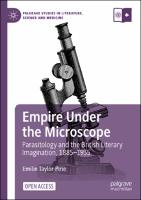Empire Under the Microscope
Parasitology and the British Literary Imagination, 1885–1935
| dc.contributor.author | Taylor-Pirie, Emilie | |
| dc.date.accessioned | 2021-12-13T18:55:42Z | |
| dc.date.available | 2021-12-13T18:55:42Z | |
| dc.date.issued | 2022 | |
| dc.identifier | ONIX_20211213_9783030847173_29 | |
| dc.identifier | OCN: 1287075583 | |
| dc.identifier.uri | https://library.oapen.org/handle/20.500.12657/51951 | |
| dc.description.abstract | This open access book considers science and empire, and the stories we tell ourselves about them. Using British Nobel laureate Ronald Ross (1857-1932) and his colleagues as access points to a wider professional culture, Empire Under the Microscope explores the cultural history of parasitology and its relationships with the literary and historical imagination between 1885 and 1935. Emilie Taylor-Pirie examines a wealth of archival material including medical lectures, scientific publications, popular biography, and personal and professional correspondence, alongside novels, poems, newspaper articles, and political speeches, to excavate the shared vocabularies of literature and medicine. She demonstrates how forms such as poetry and biography; genres such as imperial romance and detective fiction; and modes such as adventure and the Gothic, together informed how tropical diseases, their parasites, and their vectors, were understood in relation to race, gender, and nation. From Ancient Greece, to King Arthur’s Knights, to the detective work of Sherlock Holmes, parasitologists manipulated literary and historical forms of knowledge in their professional self-fashioning to create a modern mythology that has a visible legacy in relationships between science and society today. | |
| dc.language | English | |
| dc.relation.ispartofseries | Palgrave Studies in Literature, Science and Medicine | |
| dc.subject.classification | thema EDItEUR::D Biography, Literature and Literary studies::DS Literature: history and criticism::DSB Literary studies: general::DSBF Literary studies: c 1800 to c 1900 | en_US |
| dc.subject.classification | thema EDItEUR::D Biography, Literature and Literary studies::DS Literature: history and criticism::DSB Literary studies: general::DSBH Literary studies: c 1900 to c 2000 | en_US |
| dc.subject.classification | thema EDItEUR::F Fiction and Related items | en_US |
| dc.subject.other | Medicine | |
| dc.subject.other | Science | |
| dc.subject.other | Illness | |
| dc.subject.other | Disease | |
| dc.subject.other | Fin-de-siècle | |
| dc.subject.other | Epidemiology | |
| dc.subject.other | Haemotology | |
| dc.subject.other | Bram Stoker | |
| dc.subject.other | Sheridan Le Fanu | |
| dc.subject.other | Arthur Conan Doyle | |
| dc.subject.other | Open Access | |
| dc.title | Empire Under the Microscope | |
| dc.title.alternative | Parasitology and the British Literary Imagination, 1885–1935 | |
| dc.type | book | |
| oapen.identifier.doi | 10.1007/978-3-030-84717-3 | |
| oapen.relation.isPublishedBy | 6c6992af-b843-4f46-859c-f6e9998e40d5 | |
| oapen.relation.isFundedBy | 7292b17b-f01a-4016-94d3-d7fb5ef9fb79 | |
| oapen.relation.isbn | 9783030847173 | |
| oapen.collection | European Research Council (ERC) | |
| oapen.imprint | Palgrave Macmillan | |
| oapen.pages | 294 | |
| oapen.place.publication | Bern | |
| oapen.grant.number | 340121 |

